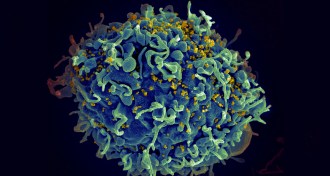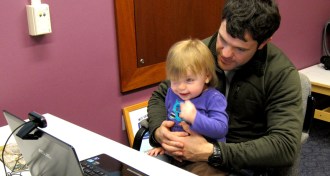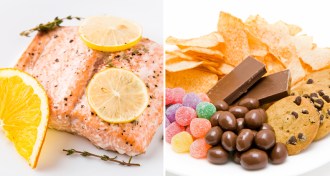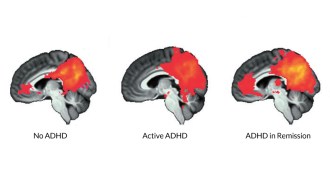Health & Medicine
-
 Life
LifeHIV hides in growth-promoting genes
The discovery that HIV can trigger infected cells to divide means scientists may need to rethink strategies for treating the virus that causes AIDS.
-
 Health & Medicine
Health & MedicineHidden heart rhythm problem may underlie some strokes
In two clinical studies, people who had had strokes with no trigger sometimes also had undiagnosed atrial fibrillation.
By Nathan Seppa -
 Health & Medicine
Health & MedicineYour baby can watch movies for science
Any parent with a computer can let their kid participate in child development studies through a new website called Lookit.
-
 Health & Medicine
Health & MedicineJunk food ahead of pregnancy may harm baby-to-be
Women who have poor diets in the year before conception might have a higher risk of delivering a baby preterm than do women who eat healthful foods
By Nathan Seppa -
 Health & Medicine
Health & MedicinePregnant women on the hook for calculating risks, benefits of fish
New draft FDA guidelines on fish for pregnant or nursing women make women do the math for how to maximize omega-3 fatty acids and minimize mercury exposure.
-
 Neuroscience
NeuroscienceSunbathing may boost endorphins in the body and brain
UV light makes mice churn out a molecule that is a cousin of morphine and heroin, a finding that may explain why some people seek out sunshine.
-
 Health & Medicine
Health & MedicineSimple blood test detects heart transplant rejection
Heart transplant recipients whose bodies are starting to reject the new organ might carry genetic warning signs.
By Nathan Seppa -
 Genetics
GeneticsGene variant tied to diabetes in Greenlanders
Greenlanders who carry two copies of a newly discovered gene variant have upwards of 10 times the chance of developing type 2 diabetes.
-
 Life
LifeAvian flu could strike Asian poultry markets outside China
H7N9 influenza has a higher chance of spreading to humans in urban areas close to water, researchers predict.
-
 Health & Medicine
Health & MedicineUlcer microbe changes quickly to avoid immune attack
During the initial weeks of infection, Helicobacter pylori, the bacterium that causes stomach ulcers, mutates at a high rate, apparently to evade the body’s defenses.
By Nathan Seppa -
 Environment
EnvironmentE-cigarettes may inflame lungs as much as cigarettes do
Acute lung impacts of e-cigarettes and tobacco cigarettes are nearly identical, new study finds.
By Janet Raloff -
 Neuroscience
NeuroscienceBrain signal reappears after ADHD symptoms fade
In adults who no longer have ADHD, brain synchrony appears.